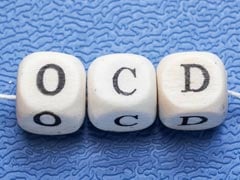A large European study states that kids and adolescents who are diagnosed with OCD are more likely to deal with educational underachievements.

"OCD often starts in childhood/adolescence and can be chronic", says expert
HIGHLIGHTS
- OCD often starts in childhood/adolescence and can be chronic
- OCD was associated with pervasive academic underachievement
- The association was not quite specific about a school subject
According to a large European study, kids who are diagnosed with Obsessive Compulsive Disorder are less likely to pass the important school tests and go on to higher studies as compared to kids who are not affected with this disorder.
Though lesser studies and low qualification can affect a person's chances of getting a job and a decent pay over time, there is a good chance that early diagnosis and treatment of this condition can reduce this gap. This was stated by researchers in JAMA Psychiatry.
One percent of the US population is affected by OCD, i.e. 2.2 million people approximately, says the Anxiety and Depression Association. OCD symptoms include obsessive thoughts and fears and a mental compulsion to repeat the same task again and again to deal with those fears.
"OCD often starts in childhood/adolescence and can be chronic," says the lead author, Dr. Ana Perez-Vigil, researcher with the Karolinska Institute in Stockholm in Sweden.
"Sufferers typically experience highly distressing thoughts and feel compelled to perform rituals (compulsions) for several hours a day. This can have a major impact on the person's ability to concentrate and benefit from school," Perez-Vigil told Reuters Health in an email.
Also read: 5 Superfoods To Improve Your Memory
For instance, people who have a fear of contamination and dirt might not be able to sit in the same place as they may feel the need to wash their hands again and again.
Another example of the same can be an obsession to read the same thing again and again till it sits in the mind which makes learning a very frustrating process.
"Everyone who regularly works with persons who have obsessive-compulsive disorder has seen that their patients often struggle with school work."
So it is not a very uncommon thing for such people to have poor attendance at school. Also, the very severe cases of OCD come from the educational system, Perez-Vigil explained.
"We have long suspected that OCD has a detrimental impact on the person's education, with all the consequences that this entails (worse chances to enter the labor market and have a high paid job), but we did not really know to what extent OCD impacts education."
Along with her colleagues, Perez-Vigil took up a number of national registers and analyzed the data of over 2 million people born in Sweden from January 1, 1976 to December 31, 1998. Follow up on this information was availed by the end of 2013.
It was found that 15000 people included in the study dealt with OCD and 81% people dealt with psychiatric diagnoses. So, 13.6% people in the study without OCD did not suffer from any other psychological condition. In addition to this, they also compared sibling pairs in about 700000 families.
All this was then compared to the number of students who attained educational milestones in the Swedish educational system.
As compared to the people who did not suffer from this condition, others were:
- 40-65% less likely to pass their important education courses in their mid-teens
- 53% were less likely to go to upper secondary school
- 39% were less likely to get to an academic upper secondary program altogether.
- 57% were less likely to finish upper secondary school
- 28% less likely to get to a university program
- 41% less likely to finish it
- 48% less likely to complete their postgraduate program
"OCD was associated with pervasive academic underachievement across the lifespan, compared to matched population controls." Perez-Vigil said.
However, the association was not quite specific about a school subject, she explained.
"We found that patients were more likely to fail every single course or subject at the end of compulsory education, including each of the core subjects."
She added that the link between OCD and academic performance was quite strong when diagnosed in kids and adolescents. However, patients with a later stage of diagnosis were quite impaired across the board.
As expected, the association was stronger in individuals first diagnosed in childhood/adolescence, though patients with a later age of onset were still substantially impaired across the board, Perez-Vigil added.
"OCD sufferers also need to cope with the social consequences of their symptoms, which they may perceive as embarrassing," she said. Severe cases may be housebound and unable to attend school altogether, and it is not uncommon for families to arrange home tuition for their children.
"We also observe that it is difficult for young people to return to school even if they have had a successful treatment with us. Considerable efforts are needed from the families, schools and mental health professionals to try to get these kids back on track," she said.
DoctorNDTV is the one stop site for all your health needs providing the most credible health information, health news and tips with expert advice on healthy living, diet plans, informative videos etc. You can get the most relevant and accurate info you need about health problems like diabetes, cancer, pregnancy, HIV and AIDS, weight loss and many other lifestyle diseases. We have a panel of over 350 experts who help us develop content by giving their valuable inputs and bringing to us the latest in the world of healthcare.














